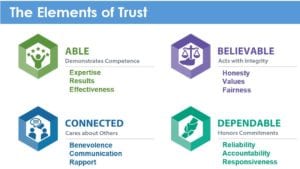
Trust, a small yet big word, is essential for any business, relationship, or endeavour to succeed. Within a business environment, and I see this all too often, if there is no foundation of trust between the leaders and the team it makes for a rather unfullfilling environment.
Daniel Pink (yes, he’s said a few notable things), writes about intrinsic motivation as being far more effective than extrinsic, such as purely financial.
There are 3 elements that constitute intrinsic motivation, says Pink – that “the secret to high performance and satisfaction at work, at school, and at home—is the deeply human need to direct our own lives, to learn and create new things, and to do better by ourselves and our world.”
This is the reason Google allows employees to utilise 20% of their time on personal projects, which have proven hugelly lucrative for the company with 40% of their products emerging from these projects.
In order for such a system to flourish there needs to be a level of trust. Trust in the organisation, in the team, and for the team members to trust themselves.
Trust is a big (huge) word. Executives I coach often bring this up as a focal point – how to trust their team. Trust of course is a two-way street.
Ken Blanchard developed a wonderful model to understand how to become trustworthy. His ABCD model lays out 4 quadrants –
Able, ability to demonstrate competence
Believable, Act with Integrity
Connected, Do you care about others
Dependable, Do you maintain reliability

Turn these 4 categories around to yourself, are you capable, honest, empathetic and reliable? No matter what your role or position, using this model as a foundation can help you build a culture or trust within your teams and organisations, and in particular with yourselves.
“Trust is the foundation of any healthy and successful relationship – not just in business!.”
